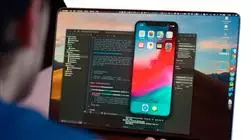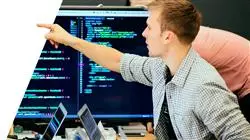University certificate
The world's largest faculty of information technology”
Introduction to the Program
Master the tools like an expert and understand the technologies implemented in Mobile Application Development Programming"

As credible as it may be for some professionals to believe they have mastered everything about mobile devices, there are still many scenarios in which they can play unimagined roles. There is still room for improvement in many of the interactions that these mobile devices already mediate; they can still be made much more efficient. It is undeniable that mobile devices have changed the world forever, but their transformative power has not been exhausted, nor has the human imagination.
This Postgraduate diploma will analyze the indispensable technical skills that the programmer must acquire to develop quality software: Git, GitHub, Command Terminal and other tools. As well as to provide specialized knowledge to carry out the installation and configuration of the most used tools as a programmer. To develop the key concepts of programming and the Internet, the Web and its operation, programming paradigms, logical structures, design principles, algorithm analysis and other relevant aspects that can be mastered upon completion of this program.
The teaching team will provide you with exclusive content designed for this program, in order to build a criterion that will facilitate the professional's decision-making in each project. That is why special care has been taken in drafting all the contents of this program, placing special emphasis not only on the most advanced theory but also on their own professional experience. The syllabus is therefore enriched by the teachers' own contributions, which adapt all the content to the reality of today's labor market.
To make access to this qualification more efficient, TECH has the best study methodology based on Relearning, and also 100% online, which avoids unnecessary travel and provides gains in time and quality in the process. Therefore, in 6 months, students will acquire the precise basis to undertake consulting tasks in all aspects related to mobile technology, develop their own business or climb positions in their employment status.
Boost your career and specialize as a Mobile Application Development Programmer. Completely remotely and in the hands of experts"
This Postgraduate diploma in Mobile Application Development Programming contains the most complete and up-to-date program on the market. The most important features include:
- The development of practical cases presented by experts in Mobile Application Development
- The graphic, schematic, and practical contents with which they are created, provide practical information on the disciplines that are essential for professional practice
- Practical exercises where self-assessment can be used to improve learning
- Its special emphasis on innovative methodologies
- Theoretical lessons, questions for experts and individual reflection work
- Content that is accessible from any fixed or portable device with an Internet connection
With this program you will obtain the indispensable technical skills that the programmer must acquire to develop quality software: Git, GitHub, Command Terminal and other tools”
The program’s teaching staff includes professionals from the sector who contribute their work experience to this educational program, as well as renowned specialists from leading societies and prestigious universities.
Its multimedia content, developed with the latest educational technology, will allow professionals to learn in a contextual and situated learning environment, i.e., a simulated environment that will provide immersive education programmed to prepare in real situations.
The design of this program focuses on Problem-Based Learning, by means of which professionals must try to solve the different professional practice situations that are presented to them throughout the program. For this purpose, the student will be assisted by an innovative interactive video system created by renowned and experienced experts.
You will have multimedia resources and diverse content formats for an agile and efficient learning process"

Enroll now in this Postgraduate diploma and don't wait any longer to stand out in your job or business"
Why study at TECH?
TECH is the world’s largest online university. With an impressive catalog of more than 14,000 university programs available in 11 languages, it is positioned as a leader in employability, with a 99% job placement rate. In addition, it relies on an enormous faculty of more than 6,000 professors of the highest international renown.

Study at the world's largest online university and guarantee your professional success. The future starts at TECH”
The world’s best online university according to FORBES
The prestigious Forbes magazine, specialized in business and finance, has highlighted TECH as “the world's best online university” This is what they have recently stated in an article in their digital edition in which they echo the success story of this institution, “thanks to the academic offer it provides, the selection of its teaching staff, and an innovative learning method aimed at educating the professionals of the future”
A revolutionary study method, a cutting-edge faculty and a practical focus: the key to TECH's success.
The most complete study plans on the university scene
TECH offers the most complete study plans on the university scene, with syllabuses that cover fundamental concepts and, at the same time, the main scientific advances in their specific scientific areas. In addition, these programs are continuously being updated to guarantee students the academic vanguard and the most in-demand professional skills. In this way, the university's qualifications provide its graduates with a significant advantage to propel their careers to success.
TECH offers the most comprehensive and intensive study plans on the current university scene.
A world-class teaching staff
TECH's teaching staff is made up of more than 6,000 professors with the highest international recognition. Professors, researchers and top executives of multinational companies, including Isaiah Covington, performance coach of the Boston Celtics; Magda Romanska, principal investigator at Harvard MetaLAB; Ignacio Wistumba, chairman of the department of translational molecular pathology at MD Anderson Cancer Center; and D.W. Pine, creative director of TIME magazine, among others.
Internationally renowned experts, specialized in different branches of Health, Technology, Communication and Business, form part of the TECH faculty.
A unique learning method
TECH is the first university to use Relearning in all its programs. It is the best online learning methodology, accredited with international teaching quality certifications, provided by prestigious educational agencies. In addition, this disruptive educational model is complemented with the “Case Method”, thereby setting up a unique online teaching strategy. Innovative teaching resources are also implemented, including detailed videos, infographics and interactive summaries.
TECH combines Relearning and the Case Method in all its university programs to guarantee excellent theoretical and practical learning, studying whenever and wherever you want.
The world's largest online university
TECH is the world’s largest online university. We are the largest educational institution, with the best and widest online educational catalog, one hundred percent online and covering the vast majority of areas of knowledge. We offer a large selection of our own degrees and accredited online undergraduate and postgraduate degrees. In total, more than 14,000 university degrees, in eleven different languages, make us the largest educational largest in the world.
TECH has the world's most extensive catalog of academic and official programs, available in more than 11 languages.
Google Premier Partner
The American technology giant has awarded TECH the Google Google Premier Partner badge. This award, which is only available to 3% of the world's companies, highlights the efficient, flexible and tailored experience that this university provides to students. The recognition as a Google Premier Partner not only accredits the maximum rigor, performance and investment in TECH's digital infrastructures, but also places this university as one of the world's leading technology companies.
Google has positioned TECH in the top 3% of the world's most important technology companies by awarding it its Google Premier Partner badge.
The official online university of the NBA
TECH is the official online university of the NBA. Thanks to our agreement with the biggest league in basketball, we offer our students exclusive university programs, as well as a wide variety of educational resources focused on the business of the league and other areas of the sports industry. Each program is made up of a uniquely designed syllabus and features exceptional guest hosts: professionals with a distinguished sports background who will offer their expertise on the most relevant topics.
TECH has been selected by the NBA, the world's top basketball league, as its official online university.
The top-rated university by its students
Students have positioned TECH as the world's top-rated university on the main review websites, with a highest rating of 4.9 out of 5, obtained from more than 1,000 reviews. These results consolidate TECH as the benchmark university institution at an international level, reflecting the excellence and positive impact of its educational model.” reflecting the excellence and positive impact of its educational model.”
TECH is the world’s top-rated university by its students.
Leaders in employability
TECH has managed to become the leading university in employability. 99% of its students obtain jobs in the academic field they have studied, within one year of completing any of the university's programs. A similar number achieve immediate career enhancement. All this thanks to a study methodology that bases its effectiveness on the acquisition of practical skills, which are absolutely necessary for professional development.
99% of TECH graduates find a job within a year of completing their studies.
Postgraduate Diploma in Programming for Development of Applications for Mobile Devices.
Programming is a fundamental part of device application development, as it allows the creation of software for mobile devices with different operating systems, such as iOS and Android. Programming for device application development involves the use of different programming languages and tools, depending on the operating system for which the application is being designed. For the development of applications for mobile devices, one of the most commonly used programming languages for iOS is Swift, which is a modern programming language developed by Apple to create applications for its devices. In the case of Android, the most widely used programming language is Java, although it is also possible to use Kotlin, a modern programming language that has gained popularity in recent years.
In programming for the development of applications for devices it is necessary to have knowledge of the object-oriented programming paradigm, since most of the programming languages used to develop mobile applications are based on this paradigm. In addition, frameworks are used for mobile application development, such as UIKit for iOS and Android SDK for Android. A framework is a tool that allows developers to create mobile applications more efficiently and quickly by providing common features and functionality that would otherwise have required tedious and repetitive programming.
Programming for device app development also includes the use of integrated development tools (IDEs) such as Xcode for iOS and Android Studio for Android. These tools provide a complete development environment, complete with code editor, testing and debugging environment, and code analysis tools.
Programming is a fundamental part of developing applications for devices, and requires the use of different programming languages, frameworks and tools, depending on the operating system for which the application is being developed. In addition, it is important to have knowledge of the object-oriented programming paradigm to develop efficient and high-quality mobile applications.







